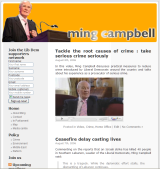Transcript of Ming’s videocast with Nicola Davies and Liz Barker
View the original video of this transcript »
Liz Barker: Ming who’s the woman who’s had the most profound effect on you …
Ming Campbell: Well my mother obviously who was very keen on sport and was a very good sportswoman herself, and but for the fact that she had to go and work in the family shop on Saturdays might well have played hockey for Scotland. And my wife to whom I’ve been married since 1970 and who’s my secretary and who really is my alter ego.
But I remember a particular group of women who taught me at primary school. Mainly they were spinsters, they had devoted themselves to teaching, in some cases because the opportunities for marriage had been destroyed by the First World War and I remember in particular Miss Brydon who was clad in several yards of black bombazine all held together with a cameo brooch. If the cameo brooch had ever broken, heavens knows what the result would have been.
But the reason I understand about language and about sentences and about structure and syntax, all these slightly unfashionable things, that every Friday morning Miss Brydon in her own very inimitable way made sure we understood the English language.
LB: You mentioned your mum and how she couldn’t fulfil her aspirations principally for economic reasons. That still holds true today doesn’t it for a lot of women. What would you, what would you do about that?
MC: Well not only was my mother frustrated about sport, she was frustrated about education because she was perfectly capable of going to university. Indeed right up until the time she died she read, she read literature and poetry. Her interest in these things was maintained all the way through her life. And that was a direct result of economic considerations. Also some selfishness on the part of her own mother (indistinct) a sort of failure to realise perhaps that things were changing and that people should be given wider opportunity.
I believe in opportunity. I’ve had three great opportunities in my life. One was sport, the other was the law and now politics. And everyone should have these opportunities and it should be irrespective of gender or orientation or ethnic background. If our Party should stand for anything it should stand for the universality of opportunity.
Nicola Davies: You talk about the importance of people having the opportunity to fulfil their aspirations and have real equality to achieve and fulfil their potential. How do you feel about the role of women in the House of Commons having the opportunity to make sure that the House of Commons reflects society outside?
MC: Well one of the most impressive Speakers since I’ve been here of course is Betty Boothroyd who went right to the top in that sense. But we have to open the House of Commons up so that it reflects the diversity and the nature of British society and it doesn’t do that at the moment. Now as it happens we’ve got four of the brightest young women in politics in our Party and I’m delighted that they’re all supporting me in this campaign. But they in a sense, they had to battle their way through. We must draw on their lessons, we must draw on their experiences to make sure that others get the same chance.
ND: How do you think that you specifically as Leader will be able to bring that about?
MC: One of the things I would like to do is to seek specific funding and to establish a trust fund with the purpose of supporting financially women candidates and candidates from the ethnic minorities.
ND: Very important.
MC: And that would ensure that for example if you ask someone to come down from the North West, spend a weekend in London learning the skills that will enable that person to put himself or herself forward to be a candidate in a winnable seat then you’ve got to make sure their fares get paid, they get put up in a decent place and in the case of a woman you may have to provide some help with child care. I’ve got a little mnemonic. I call it SOR. Skills, Opportunity and Resources. We must ensure that everyone has access to the skills that will enable them to compete in political terms at the highest level …
ND: Yes.
MC: … for a good candidature. Opportunity, we must ensure that once these skills are acquired that local associations understand that they’ve got to be much more open minded than they have been sometimes in the past …
ND: Absolutely.
MC: … I’ve heard some pretty horrific stories of the kind of questions that are being asked and the kind of subtle prejudices that have been on, on display. And then resources. There’s no point talking about these things unless you back them up with money. That’s the only way in which we will make our Party a model of what the House of Commons ought to be.
Liz Barker: Thanks very much, I think. One last question for you. The end of a Ming Campbell leadership, what would you like your legacy to be in terms of Liberal Democrats and women?
MC: Well I’m not going to put numbers on it. But I would like to think that by the time I finished being Leader there was no position in the Party to which women could not legitimately aspire and achieve. I’d like the benches of the Liberal Democrats in the House of Commons to look like the country. If I could achieve that then I would regard that as being a major sign post, not just for our Party, but for Parliament and for the country as well.
LB: Thank you.



